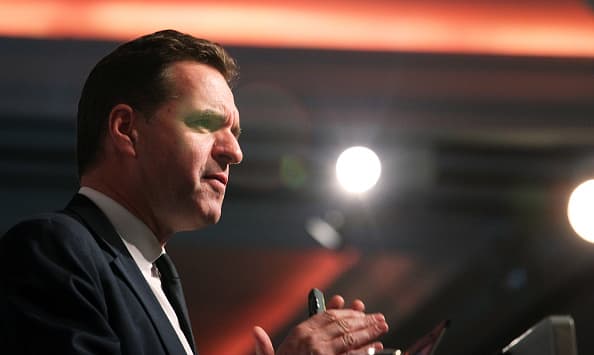Is the U.S. economy showing no signs of a recession or hurtling inescapably towards one? Is it in fact already in one?
More than a month after the country recorded two successive quarters of economic contraction, it still depends who you ask.
Steve Hanke, professor of applied economics at Johns Hopkins University, believes the U.S. is headed for a “whopper” of a recession in 2023. While Stephen Roach of Yale University agrees it will take a “miracle” for the U.S. to avoid a recession next year — but it won’t be as bad as the downturn of the early 1980s.
Yet the Nobel Prize-winning economist Richard Thaler says he doesn’t see “anything that resembles a recession” in the U.S. right now, pointing to recent low unemployment, high job vacancies, and the fact that the economy is growing — just not as fast as prices.
And market participants are similarly divided.
Liz Ann Sonders, chief investment strategist at Charles Schwab, says a recession is more likely than a soft landing for the U.S. economy right now, although it may be a rotational recession that hits the economy in pockets.
While Steen Jakobsen, chief investment officer at Saxo Bank, was clear in a recent interview with CNBC: the U.S. is not heading for a recession in nominal terms, even if it is in real terms.
Recent surveys reflect the split. A Reuters poll of economists in late August put the chance of a U.S. recession within a year at 45% (with most saying one would be short and shallow), and a Bloomberg survey put the probability of a downturn at 47.5%.
Mixed signals
So why the discrepancy? It depends what you focus on: gross domestic product (GDP), or the jobs market.
U.S. GDP declined by 0.9% year-on-year in the second quarter and by 1.6% in the first, meeting the traditional definition of a recession. The slump in growth was driven by a number of factors including falling inventories, investment and government spending. Inflation-adjusted personal income and saving rates also fell.
However, in the U.S. a recession is officially declared by the National Bureau of Economic Research, which likely won’t make a judgment on the period in question for some time.
What makes this time different from every other six-month period of negative GDP since 1947 has been continued strength in the jobs market.
The closely-watched nonfarm payrolls data for August, released Friday, showed nonfarm payrolls increased by 315,000 — a solid rise, but the lowest monthly gain since April 2021.
It added to other recent releases which have shown a slowdown in private payroll growth, but a much higher rate of new job openings than expected.
William Foster, senior credit officer at Moody’s, said jobs-versus-GDP continued to be the big debate among economic commentators, against a backdrop of the U.S Federal Reserve changing quickly from an accommodative monetary policy — where it adds to the money supply to boost the economy — to a restrictive one, involving interest rate hikes in order to tackle inflation, which hit 8.5% in July.
“We’re coming out of an extraordinary period that’s not been seen before in history,” Foster told CNBC by phone.
When making its decision, the National Bureau of Economic Research looks at real income for households, real spending, industrial production and the labor market and unemployment — and those variables aren’t giving clear recession signals, Foster said.
“The jobs market is still struggling to hire people, particularly in the services sector,” he said.
Wider indicators
Foster also noted that households were still spending relatively strongly, albeit at a slower rate of growth, enabled by the period of accumulation of household savings during the pandemic.
However, at the recent Ambrosetti Forum in Italy, economist Joseph Stiglitz told CNBC he was concerned about the fall in real wages workers were experiencing despite the tight labor market.
As well as disagreeing on which indicators to focus on, commentators are also split on what certain sectors are showing.
Investor Peter Boockvar says the latest data on housing and manufacturing show why the U.S. will not be able to avoid a recession, with the National Association of Home Builders/Wells Fargo Housing Market Index dropping into negative territory in August.
But according to Saxo Bank’s Jakobsen: “We still have double digit increases in the rental market. That is not going to create a recession.”
“Simply, people have enough money on the balance sheet to buy an apartment and rent it out and make 20 to 30%. So [a recession] is not going to happen.”
Volatile times
There are broader reasons for the current level of debate too, said Alexander Nutzenadel, professor of social and economic history at the Humboldt University of Berlin.
“We live in a period of multiple shocks – from Covid 19 over energy prices to political deglobalization – which make predictions extremely difficult,” he told CNBC by email.
This means the economic performance of a highly developed country such as the U.S. depends heavily on external factors.
The current situation of “stagflation” — when high inflation and economic stagnation occur simultaneously — is historically rare, he continued, though not completely unprecedented.
“We had a similar moment in the 1970s, but from this experience we know that monetary policy has enormous difficulties to find the right balance between fighting inflation and preventing a recession.”
Finally, he noted that the economics profession had become “much more diverse” in recent years.
“There is no ‘mainstream economics’ anymore, everything has become controversial, including theory, data and methods,” Nutzenadel said.
The very practice of having a recession officially declared by the National Bureau of Economic Research has recently been questioned by some, with Tomas Philipson, professor of public policy studies at the University of Chicago, recently asking: “Why do we let an academic group decide? We should have an objective definition, not the opinion of an academic committee.”
In any case, Philipson concluded, “What really matters is paychecks aren’t reaching as far. What you call it is less relevant.”
— CNBC’s Jeff Cox contributed to this report.
Get CyberSEO Lite (https://www.cyberseo.net/cyberseo-lite) – a freeware full-text RSS article import plugin for WordPress.




